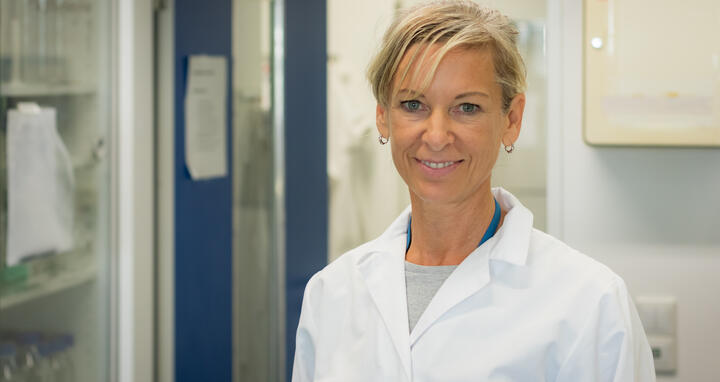The hidden talents of microglia
It all started in the Namibian desert, where a young woman was observing the mating habits of head-stander beetles. “From that point on, I wanted to understand how behavior is encoded at a cellular level,” says Dr. Susanne Wolf, who has spent the past 25 years in neurobiological research, specializing in the interactions between the immune system and the central nervous system.
Exploring different facets of neuroscience
I’ve worked in a lot of interesting places, but the MDC has always been a scientific home for me.
Wolf started out investigating neuron formation (neurogenesis) in specific regions of the brain. “Neurogenesis still happens into old age and can be stimulated – by jogging, for instance,” says Wolf, who began researching the mechanisms behind this in 2003, when she was working at the MDC as a postdoc with stem cell researcher Gerd Kempermann. Wolf then continued this work at Stanford University, focusing on therapies for Parkinson’s disease. Returning to Europe, she took a position with the Institute for Neuroanatomy at the University of Zurich, where she explored how microglia interact with neuronal stem cells in a schizophrenia mouse model.
Microglia are the macrophages of the brain and part of the immune system. Their main task is to eliminate pathogens and dead cells. Even in the womb, microglia engulf and destroy surplus connections between neurons. “But they’re also in close contact with neurons and astrocytes, and they play a crucial role in forming and maintaining neural networks. And by doing that, they impact our behavior,” says Wolf.
From Zurich, Wolf returned to the Max Delbrück Center and joined Helmut Kettenmann’s team, where she focused on how microglia function in Alzheimer’s and gliomas (a type of brain tumor). She then qualified as a professor at the Department of Ophthalmology at Charité – Universitätsmedizin Berlin, specializing in experimental neuroscience and developing models for diabetes and age-related macular degeneration. In both conditions, microglia are the target for therapeutically relevant agents. “The eye is also interesting from a diagnostic perspective. You can use it to identify vascular disease at an early stage. It’s also an important window to the brain, which enables noninvasive diagnoses of psychiatric changes such as those in autism,” she says.
Examining psychiatric disorders and cognitive deficits
Wolf, now 53, has recently returned to the Max Delbrück Center – this time as a lab leader, and she’ll be staying for longer. “I’ve worked in a lot of interesting places, but the MDC has always been a scientific home for me,” says Wolf, who values the MDC for its many collaborative opportunities, its technology platforms, and its short distances. She’s also looking forward to working with Dr. Hanna Hörnberg, whose lab explores the molecular and cellular basis of behavior, and with the teams led by Dr. Philip Mertens, Professor Oliver Daumke, Professor Holger Gerhard, Professor Jennifer Kirwan, to name just a few.
Part of her work will center on the interplay between microglia and synapses. “I used to always focus on cell-cell interactions. Now I’m adding the synaptic part – specifically in models for autism, where synaptic scaffold proteins such as neuroligin-4 are altered. I’ll be looking at the brain and eyes for this.” Wolf also wants to investigate the neuroimmunological mechanisms that lead to cognitive deficits in patients with diabetes. She suspects that microglia cells also play a key role here.
So today, 25 years after deciding to pursue this route in the Namibian desert, Wolf is still exploring which molecules encode our behavior.
Text: Catarina Pietschmann






